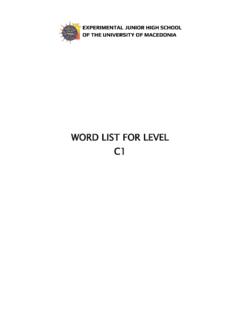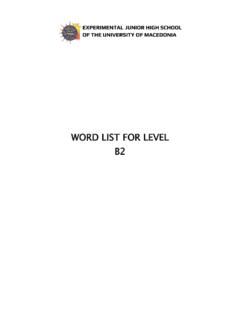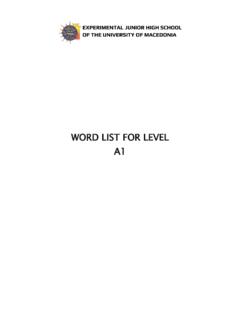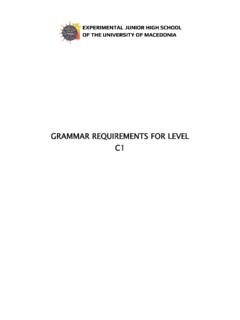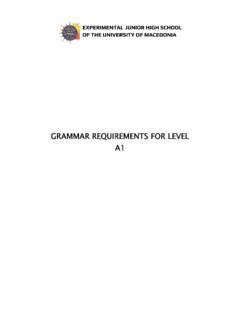Transcription of WORD LIST FOR LEVELS C1-C2
1 WORD LIST FOR LEVELS . C1-C2 . This publication has made use of the English Vocabulary Profile. This resource is based on extensive research using the Cambridge Learner Corpus and is part of the English Profile programme, which aims to provide evidence about language use that helps to produce better language teaching materials. See for more information. Compiled electronically by Efthimios Mavrogeorgiadis. Abbreviations ! Culturally Sensitive Word + two objects A verb that has two objects. C. Countable noun: a noun that has both singular and plural forms. C usually no plural or U. Countable noun which usually has no plural or uncountable noun. I. Intransitive verb: a verb that has no object. T. Transitive verb: a verb that has an object. U. Uncountable noun: noun with no plural form.
2 Cannot be used with 'a', 'an', or 'one'. UK. British English US. American English abbreviation A short form of a word or phrase. adjective A word that describes a noun or pronoun. 3. adverb A word that describes or gives more information about a verb, adjective or other adverb. approving Used in a positive way, to show that you have a good opinion of someone or something. auxiliary verb The verbs 'be', 'have' and 'do' when combined with other verbs to make different forms. before noun An adjective that always comes before a noun. conjunction A word used to join parts of a phrase or sentence. determiner Word used before noun or adj to show which person or thing is being referred to. disapproving Used in a negative way, to show that you have a bad opinion of someone or something.
3 Exclamation A word or phrase that you say loudly or suddenly to express strong feelings. formal Used in serious writing, or for communicating with people in a serious or polite way. informal Used in relaxed situations, for example with friends and family. Used more in speech. literary Used in books and poems, and not in ordinary conversation. 4. modal verb Verb such as can, might, must. With another verb, shows an idea such as possibility. noun A word that refers to a person, place, idea, event or thing. often passive In a passive verb/sentence, the subject does not do the action but is affected by it. often plural Refers to more than one person or thing. phrasal verb Verb with an adverb or preposition, with meaning different from meaning of its parts.
4 Plural Refers to more than one person or thing. preposition Word used before noun, pronoun or -ing form of verb to show place, direction, etc. pronoun A word used instead of a noun, which has usually already been talked about. specialized Used in connection with a particular area of work or study. symbol A sign, shape or object used to represent something else. verb A word that describes an action, condition or experience. written abbreviation A short form of a word or phrase only used in writing 5. 6. A. abandon / b n/. Word family: Verbs: abandon Adjectives: abandoned VERB [T]. STOP DOING. [C1] to stop doing something before it is finished, or to stop following a plan, idea, etc. Dictionary example: The match was abandoned because of rain. Learner example: How would you feel if you establish[ed] a long-time plan for your career and then you ha[d] to abandon it?
5 Able / e .bl /. Word family: Nouns: ability, disability, inability Verbs: enable Adjectives: able, disabled, unable ADJECTIVE. CLEVER. [C2] clever or good at doing something Dictionary example: She's a very able student. Learner example: They contend that this will lead to better grades, better results in key stage test[s], and a more able work force. 7. abnormal / b n m l/. Word family: Nouns: norm, normality Adjectives: normal, abnormal Adverbs: normally ADJECTIVE. [C1] different from what is normal or usual, in a way which is strange or dangerous Dictionary examples: abnormal behaviour/weather They found abnormal LEVELS of lead in the water. Learner example: The cost of it for the Chinese population is an abnormal level of pollution, that causes many deaths every year.
6 Aboard / b d/. ADVERB; PREPOSITION. [C1] on or onto a plane, ship, bus, or train Dictionary example: Welcome aboard flight BA109 to Paris. Learner example: Competition entry "Welcome aboard on the flight to ancient " Please fasten your abortion / b . n/. NOUN [C or U]. [C1] ! a medical operation to end a pregnancy when the baby is still too small to live Dictionary example: She had an abortion. Learner example: Some of these problems are serious and should be eliminated, such as abortion and domestic violence. 8. above / b v/. ADVERB; PREPOSITION. TOO IMPORTANT. [C2] too good or important for something Dictionary example: No one is above suspicion in this matter. abrupt / br pt/. Word family: Adjectives: abrupt Adverbs: abruptly ADJECTIVE. SUDDEN. [C2] sudden and not expected Dictionary example: Our conversation came to an abrupt end.
7 Learner example: Their income came from the revenues obtained by selling milk, fruit, jelly and other perishable goods, but they had to pay John, or their happy lifestyle would come to an abrupt end. RUDE. [C2] dealing with people in a quick way that is unfriendly or rude Dictionary example: She has a rather abrupt manner. Learner example: I was poorly received and the general tone of the person assisting me was rude and abrupt. abruptly / br Word family: Adjectives: abrupt Adverbs: abruptly ADVERB. [C2] suddenly and quickly 9. Dictionary examples: They abruptly left the party. His speech ended abruptly and he left the stage. Learner example: When she became an adolescent, her perspective changed abruptly. absolutely / .lu Word family: Adjectives: absolute Adverbs: absolutely ADVERB.
8 Absolutely! [C1] used to strongly agree with someone Dictionary examples: "Do you think it helped his career?" "Absolutely.". "It was an excellent film, though." "Absolutely!". Learner example: So have the Swedish grandparents got funkier? Absolutely! Absolutely not. [C2] used to strongly disagree with someone or to agree with something negative Dictionary example: "Are you suggesting that we should just ignore the problem?" "No, absolutely not.". Learner example: Does it mean the parents will allow them to eat anything they please? Absolutely not. You have to give the children some options, instead of imposing things on them. absorb / b z b/. VERB [T]. REMEMBER. [C1] to understand and remember facts that you read or hear Dictionary example: It's hard to absorb so much information.
9 Learner example: You will have only three school [subjects] and that'[ll] make it easier to absorb the new knowledge. 10. abuse / bju s/. Word family: Nouns: abuse Adjectives: abusive NOUN. WRONG ACTION. [C1] ! [C or U] an action or activity that is morally wrong or not allowed Dictionary example: The politician's behaviour was an abuse of power. Learner example: It is a vast resource of information, but the abuse of it may have detrimental consequences. LANGUAGE. [C2] ! [U] rude and offensive words said to another person Dictionary example: Rival fans shouted abuse at each other. Learner example: I went all the way back cycling on the wrong side of the road, and anyone who said something about it could expect a stream of abuse. abusive / bju s v/.
10 Word family: Nouns: abuse Adjectives: abusive ADJECTIVE. [C2] saying rude and offensive words to someone Dictionary example: an abusive phone call Learner example: This is partly true, because even [a] slightly abusive expression might result in discord or [rupture]. between seemingly close friends. 11. academic / k. dem. k/. ADJECTIVE. CLEVER. [C2] clever and good at studying Dictionary example: He's not very academic. accelerate / k sel..re t/. VERB. HAPPEN. [C1] [I or T] to start to happen more quickly, or to make something start to happen more quickly Dictionary example: Inflation is likely to accelerate this year. Learner example: Fashion has always been changing but I think this process accelerated after the Second World War. VEHICLE. [C2] [I] to move or cause yourself or a vehicle to move faster Dictionary example: The car in front accelerated and left us behind.


